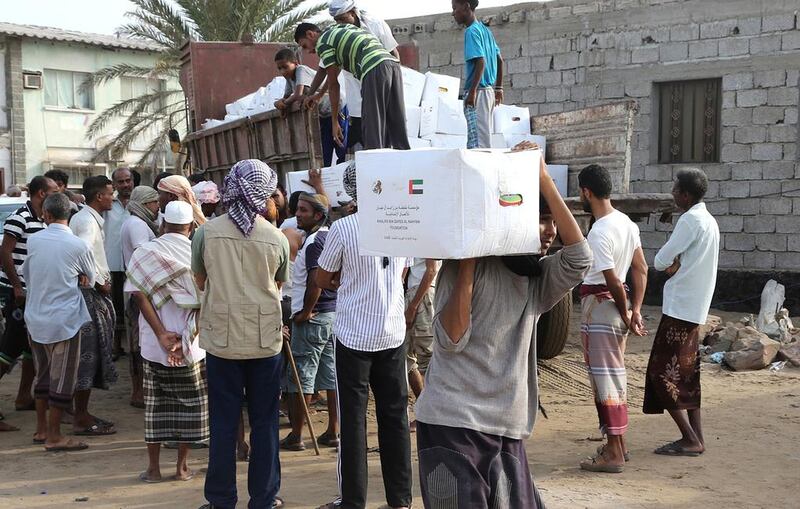The UAE’s generosity through humanitarian aid to Yemenis caught up in their country’s power struggle is indisputable.
Since the start of the crisis, the UAE has provided assistance to the tune of Dh430 million, with a good deal of that money being spent during Ramadan and into these Eid holidays.
Sheikha Lubna Al Qasimi, Minister of International Cooperation and Development and head of the UAE Committee for the Coordination of Humanitarian Foreign Aid, is enforcing the view that providing humanitarian assistance is a moral necessity befitting the legacy of the UAE's Founding Father, Sheikh Zayed.
The President, Sheikh Khalifa, insisted Sheikha Lubna assume direct responsible for addressing the needs of the Yemeni people caught up in the fighting between Iran-backed Houthi rebels and a coalition including the UAE that supports exiled president Abdrabu Mansur Hadi.
Sheikha Lubna’s UAE Committee for Coordination of Humanitarian Foreign Aid is an organisational masterpiece. Through it she oversees the Emirates Red Crescent, the Khalifa bin Zayed Al Nahyan Foundation, the Mohammed bin Rashid Al Maktoum Charity and Humanitarian Establishment, the Zayed bin Sultan Al Nahyan Charitable and Humanitarian Foundation, the UAE Water Aid Foundation, Sheikh Sultan bin Khalifa Al Nahyan Humanitarian & Scientific Foundation, Sharjah Charity House, Al Rahmah Charity Association, and Sharjah Charity International.
The number of UAE humanitarian and charitable institutions is testimony to the high values that the country puts on human safety and security, especially in war zones such as Yemen.
About 8,000 tonnes of food, fuel and medicine have been sent to Yemen from the UAE via ships, dozens of flights and a contingent of trucks, with more aid on the way through Eid and beyond.
The Red Crescent has sent more than 830 tonnes of aid and supplies to parts of Yemen affected by the fighting, while flights containing medical and food aid were organised by the Khalifa Foundation. This followed the foundation’s shipment of 400 tonnes of food and 300 barrels of diesel to Yemen’s Socotra island.
In addition, people injured in Houthi attacks are being taken to UAE hospitals for treatment.
Dubai's International Humanitarian City, near Jebel Ali Port, has become a hub of aid activity, with shipments leaving Jebel Ali for Djibouti before going on to Yemen, a trip that takes 10 days. Sleeping mats, blankets, kitchen sets and plastic tarpaulins are part of the ongoing humanitarian flow on these ships.
In addition, the UN’s refugee agency, which is operating from Sharjah, delivers emergency aid flights to the Yemeni capital Sanaa when possible. At the last count, 150 metric tonnes of relief had been delivered, in what is part of the larger aid effort to help 250,000 people in Yemen.
Delivering such vast quantities of aid into a hot and dangerous location is impressive and a tribute to the UAE’s compassion.
The fact that two major days that highlight humanitarian issues – Sheikh Zayed Humanitarian Work Day and World Refugee Day – occurred during the holy month helped focus the spotlight even more on the plight of Yemenis but also on many others who are afflicted by warfare, famine and disease.
The huge amount of aid given allied with the humanitarian days made this year’s Ramadan and Eid a remarkable time of giving to those who are less fortunate and under duress.
Discussing the UAE’s aid effort in Yemen would not be complete without a mention of the Armed Forces. The President and Sheikh Mohammed bin Zayed, Crown Prince of Abu Dhabi and Deputy Supreme Commander of the Armed Forces, ordered airdrops of critically needed supplies into areas of the country impossible to reach by other means.
Even before Ramadan, these aid drops amounted to 55 tonnes. More are planned as part of the Saudi-led coalition’s Operation Restore Hope, which is being coordinated by the Relief Operations Centre in Riyadh.
It is significant to note the civil-military coordination of humanitarian aid. Civilian humanitarian logistics are being augmented by military airlift and delivered to the right people on the ground. This bypasses the sometimes fraught on-the-ground methods of aid delivery, which can be interrupted by those who only want more suffering.
Overall, this holy month and Eid is a time for reflection on triumphs and lessons learnt. After the holiday, more effort will be required to help the Yemeni people and the world can be sure that the UAE will be at the frontline.
newsdesk@thenational.ae
Dr Theodore Karasik is a UAE-based geopolitical analyst and commentator on UAE foreign affairs.






